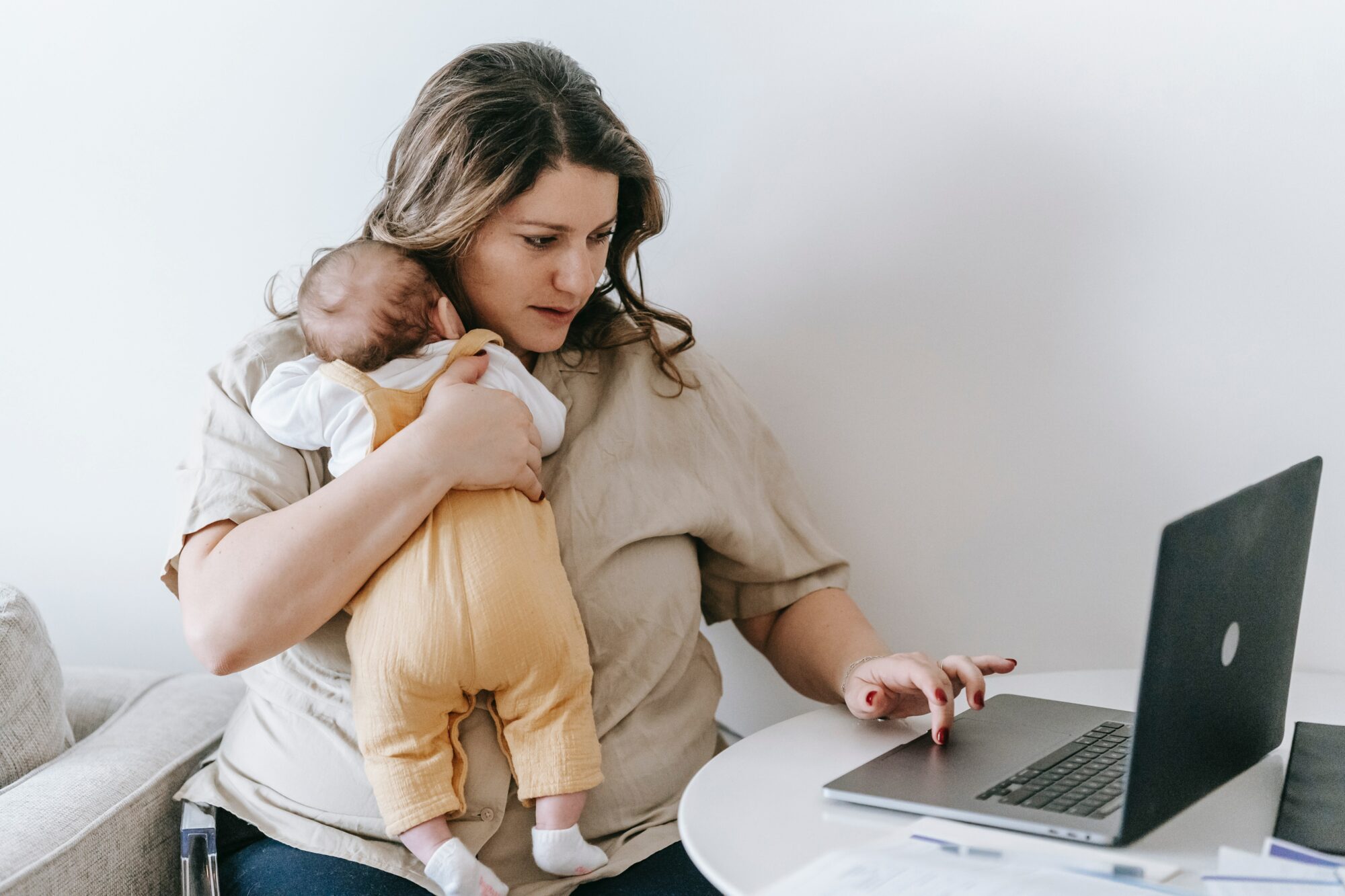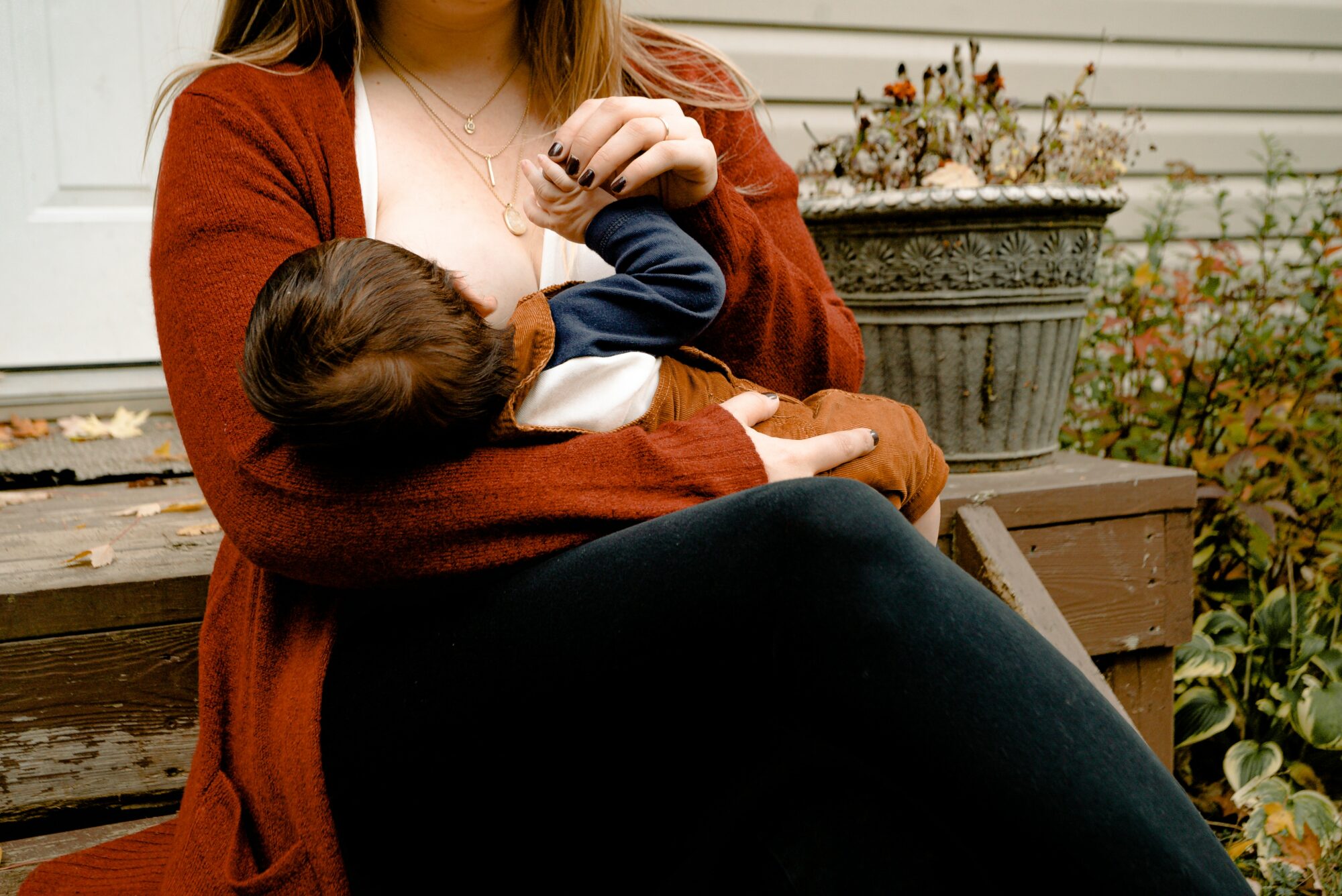Returning to work after maternity leave is a challenging and emotional time for many women. There are often conflicting emotions and mums can feel pulled in a number of different directions, unsure how to make everything work.
If you’re due to return to work after having a baby, you might be feeling sad that the special time with your baby has come to an end. You might be relishing the opportunity to get back to the workplace and enjoy a hot cup of tea alongside some adult conversation. You might feel guilty for making career decisions that impact your family and your child. Or even more likely, you’ll experience a combination of all these emotions – and more – all at the same time!

Making all the new logistics work is hard enough in isolation. But throw into the mix a bit of sleep deprivation and the emotional impact of separating from your child, stopping or changing your breastfeeding routine and your little one starting nursery, and it’s no wonder that the prospect of returning to work after maternity leave can feel a little bit fraught for all!
However, the burden of making everything work shouldn’t land squarely on your shoulders. Employers have a responsibility to foster inclusive and supportive working environments for all staff and this includes working parents, pregnant women and women who are breastfeeding. With the correct policies in place, a woman’s reentry to the workplace after having a baby should feel exciting and supportive, instead of isolating and stressful.
While you’re on maternity leave (and ideally before you finish work to have the baby), take some time to look closely at your contract and any relevant workplace policies. This will help you to understand the support available to you when you return and what you’re entitled to during and after your maternity leave.
Your employment rights after maternity leave
There are a number of employment rights in place that protect you during your maternity leave and when you return to work. Your job and any associated benefits should not be affected when you take time off to have a baby.
How many weeks of maternity leave are women entitled to?
Working women in the UK are entitled to 52 weeks maternity leave with the right to return to work afterwards. Your employer should assume you’re taking 52 weeks unless you tell them otherwise. If you intend to return sooner than this, you need to give them at least eight weeks’ notice.
When can you return to work after giving birth?
You are not allowed to work in the two weeks after your baby is born, and this is extended to four weeks if you work in a factory. Other than this, you are entitled to return to work whenever you like, as long as you have given eight weeks notice to your employer.
Do you return to the same job after maternity leave?
You are entitled to return to the same job after your maternity leave if you’ve been away 26 weeks or less. Your pay and conditions must be the same as or better than if you hadn’t gone on maternity leave.
This differs slightly if you have been on maternity leave for longer than 26 weeks. Your employer might offer you a different role upon your return, but not without a valid reason, and it cannot be something that you’re unable to do. They can’t offer you a new job if your old job still exists (i.e. and has been given to someone else), or would exist if you hadn’t gone on maternity leave. To do so would be considered unfair dismissal and maternity discrimination.
If you are at risk of redundancy whilst on maternity leave, you have the right to be offered a suitable alternative vacancy if one exists.
What pay and benefits are you entitled to on maternity leave?
Whilst on maternity leave, you are entitled to all of your usual contractual terms and conditions, apart from any remuneration (your wages / salary). This means you can accrue holiday and should continue to receive any additional benefits like subscriptions, memberships, lunch vouchers and continue to keep your mobile phone and company car if you have one.
You are entitled to 39 weeks’ maternity pay if you meet the qualifying conditions.
Are you entitled to flexible working after maternity leave?
All employees have the right to request flexible working, and this includes when you return from maternity leave. Before making a decision, your employer must agree to meet with you to discuss it. Although they can refuse your request, they need to have a good business reason to do so and let you know in writing within three months.
You are also entitled to up to 10 days paid Keep in Touch Days or ‘KIT’ days as they’re commonly known. These paid working days are not compulsory and both the employer and employee need to agree to them, but they are a great way to keep abreast of what’s going on in the workplace whilst you’re on leave.
Above all, you have a right not to be discriminated against or unfairly treated because you are pregnant, have had a baby or have taken maternity leave. For a full breakdown of all your maternity rights, check out the Maternity Action website.
Do I have to return to work after maternity leave?
You don’t have to return to work after your maternity leave has ended. Your employment contract will tell you how much notice you need to give your employer if you don’t intend to return. If nothing is specified in your contract, you should give at least a weeks’ notice.
If you have claimed statutory maternity pay or maternity allowance, you won’t need to pay this back, even if you don’t return to work (either to the same employer or a new employer).
However, if you have received contractual maternity pay from your employer, you may need to pay some of this back if you do not return to work. Your contract should outline how long you need to return to work in order to keep the contractual maternity pay, or how much you need to pay back if you don’t return at all.
You can use up remaining holiday allowance to delay your return to work or cover the period you need to work in order to keep your contractual maternity pay. You should make sure you use or get paid for any outstanding holiday you’re entitled to before you leave so that you don’t lose it.

Tips for returning to work after having a baby
However you’re feeling about returning to work, it will no doubt take some time to adjust to the new routines, demands and logistics of juggling work and family life. We’ve compiled the following tips to help you feel confident about your return to work after maternity leave, and enable your transition to be as smooth as possible.
1. Stay networked whilst on maternity leave
Keep in Touch days are a great way to stay connected whilst on maternity leave and prevent you feeling out of the loop when you return. Try to save some of the days for the end of your leave so that the conversations you’re having are relevant to the work you’ll be doing when you fully return.
If KIT days are not an option in your workplace, try to stay connected informally instead. Drop in for team lunches or leaving parties, or meet a colleague for a coffee to catch up on what you’ve missed.

2. Focus on the positives
As much as you may be dreading having to leave your baby or are worried about performing well at work after a bad night’s sleep, there will no doubt be many positives to returning to work. That hot cup of tea, being able to pee without having an audience, the satisfaction of doing something that stimulates you mentally again. Try to focus on all the positives that returning to work will bring, especially when it all feels a bit overwhelming.
If you’re struggling to find any positives, Bloss expert Charlotte Worth offers 1:1 coaching sessions to help you feel more prepared and confident about returning to work after maternity leave.
3. Introduce your child to nursery gradually
If your little one will be starting at a new nursery or childminder when you return to work, don’t let their first day be your first day back to work. They will need time to adjust and settle and, yes, there will likely be tears (theirs and yours).
Most settings offer a gradual introduction that builds up to full days over a week or two. Try to establish this in the few weeks before you start work so that there’s less stress and emotion on your first day back.
4. Do a few practice runs
Before your first day back on the job, make time for a dummy run. Set your alarm, get showered and dressed, put on your work clothes and drop your little one at their childcare setting. Complete your normal commute (perhaps grab yourself a coffee on the way), head into work and then turn around at the door and come back.
Not only will this help you gauge how much additional time you need in the morning with a little one to get ready, but it will also make your first proper day back feel much less overwhelming.
5. Return mid week if you can
Don’t underestimate how tired you’re likely to feel in the first few days and weeks back at work. If you’re able to choose a start date that’s mid week, we’d highly recommend doing so!
That way, you’re not committing to a full week right from the get go, which will be easier on you and your little one. Better yet, start back on a Friday so that you only have to get through one day before you’re off again for the weekend!
6. Know your rights on breastfeeding
If you’re still breastfeeding when your maternity leave comes to an end, there’s no need to stop just because you’re heading back to work. You should inform your employer if you intend to express milk or breastfeed at work so that they can complete a risk assessment and establish if there are any risks.
Employers are legally required to provide a space for mums who are breastfeeding to lie down and rest if they need to. Good practice guidelines state that employers should also provide a clean and comfortable room with a lockable door (not a toilet) for you to express milk or feed, in addition to providing a clean fridge in which to store your breastmilk.
If you feel uncomfortable pumping or feeding at work, explore the possibility of flexible working. This will allow you to nip home to express milk when you need to or meet your baby to allow them to nurse.

7. Think about what you want – and ask for it
Before you return to work, talk to your employer about what is practical for you now that you’re returning to work as a parent. Discuss what they can do to facilitate a smooth and successful transition.
Do you want flexible working? Are overnight work trips out of the question? Do you have a specific time you need to leave each day? Do you want to be in the running for certain opportunities?
Be clear and realistic about what you want and don’t be afraid to ask for it. If your employer doesn’t seem very supportive or understanding, perhaps they need more training about the needs of working parents. Our bloss experts can help!
8. Set boundaries with colleagues
Likewise, make sure you establish clear boundaries with colleagues so that they know what to expect from you if your ways of working have now changed. If you need to leave at 5pm on the dot, make sure colleagues know not to send an email at 4:55pm that needs your immediate attention.
If team drinks on a Friday evening are now out of the question, suggest going for lunch or having a working breakfast instead. This will enable you to still enjoy the social side of work without it eating into precious family time.
9. Look after yourself
Working parents are at major risk of burnout if they don’t take time to look after themselves. Even when the pressures of work and home feel hard to juggle, take some time to grab a coffee with friends, exercise and enjoy some downtime to avoid the overwhelm risking your mental health.

10. Don’t feel guilty
We know it’s hard to avoid, but “mum guilt” won’t get you anywhere. Rest assured that your children won’t be psychologically damaged just because you have a paid job.
In fact, research shows that girls of mothers who work outside of the home are more likely to do well in their own careers compared with girls of stay at home parents. Boys of mothers who work outside of the home go on to perform more care work per week than boys whose mothers don’t have paid employment.
You have given a lot to your child already, and you deserve the opportunity to progress in your career, alongside having a family if that’s what you want. Happy mums equal happy kids. So try to let go of guilt and know that everything you’re doing is, ultimately, for the benefit of your little one.
How bloss can support you in your return to work
Remember, however emotional you may be feeling initially, it won’t last forever. You’ll soon find yourself settling into a routine, despite how hard it may seem at first.
If things don’t feel like they’re getting easier, and you need to seek advice, bloss has a range of workshops and resources to support working parents with stress, burnout and loneliness at work. We also offer workshops aimed at employers to improve their practices around employee wellbeing, particularly with regards to families and working parents.

Please get in touch if you would like further information on any of these workshops and good luck for your return to work – you’ve got this!
With thanks to the following bloss experts for their contributions of articles, services or workshops referenced above:
- Wilma McDonald, Nutritional Therapist
- Marisa Lonic, Career and Self-Development Coach
- Helen Davies, Health Visitor
- Elliott Rae, Inspirational Speaker and mental health advocate
- Louise Deverell-Smith, Founder of Daisy Chain
- Charlotte Worth, Professional Development Coach
- Sarah Patel, Sleep Consultant
- Dr Kimberley Bennet, Psychologist
- Alissa Pemberton, Lactation Specialist
- Abby Marcus, Working Parent Coach
- Dr Gauri Seth, Wellness Coach
- Dr Claire Conlon, Senior Clinical Psychologist
- Agi Heele, Executive Wellbeing Coach
- Nihara Krause, Consultant Clinical Psychologist





Leave a Comment
You must be logged in to post a comment.